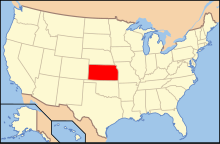List of Kansas state symbols
Wikimedia list article
The following is a list of symbols of the U.S. State of Kansas.

State symbols
change| Symbol | State symbol | Date adopted |
|---|---|---|
| State flower | Native Sunflower | March 12, 1903[1] |
| State march | The Kansas March | 1935[2] |
| State bird | Western Meadowlark | 1937[3] |
| State tree | Cottonwood | 1937[4] |
| State song | Home on the Range | 1947[5] |
| State animal | The American Buffalo | 1955[6] |
| State insect | The honeybee | 1976[7] |
| State reptile | The Ornate Box Turtle | April 14, 1986[8] |
| State amphibian | The Barred Tiger Salamander | 1993[9] |
| State grass | Little Bluestem | July 1, 2010[10] |
| State soil | Harney Silt Loam | April 12, 1990[11] |
References
change- "Kansas Quick Facts". governor.ks.gov. Archived from the original on 11 May 2011. Retrieved 30 December 2010.
- ↑ "Sunflower". Kansaspedia. Kansas Historical Society. May 2011. Retrieved September 30, 2019.
- ↑ "Kansas March". Kansaspedia. Kansas Historical Society. January 2015. Retrieved September 30, 2019.
- ↑ "Western Meadowlark". Kansaspedia. Kansas Historical Society. July 2011. Retrieved September 30, 2019.
- ↑ "Cottonwood Tree". Kansaspedia. Kansas Historical Society. January 2013. Retrieved September 30, 2019.
- ↑ "Home on the Range - Kansapedia - Kansas Historical Society". Kshs.org. Retrieved 22 February 2019.
- ↑ "Buffalo in Kansas". Kansaspedia. Kansas Historical Society. July 2010. Retrieved September 30, 2019.
- ↑ "Honeybee". Kansaspedia. Kansas Historical Society. July 2011. Retrieved September 30, 2019.
- ↑ "Ornate Box Turtle". Kansaspedia. Kansas Historical Society. July 2011. Retrieved September 30, 2019.
- ↑ "Barred Tiger Salamander". Kansaspedia. Kansas Historical Society. July 2011.
- ↑ "Little Bluestem". Kansaspedia. Kansas Historical Society. July 2011. Retrieved September 30, 2019.
- ↑ "Harney Silt Loam". Kansaspedia. Kansas Historical Society. July 2011. Retrieved September 30, 2019.
Other symbols
change- The flag of Kansas
- The seal of Kansas
- Kansas' state saying, Ad astra per aspera (Latin, To the stars through difficulty)